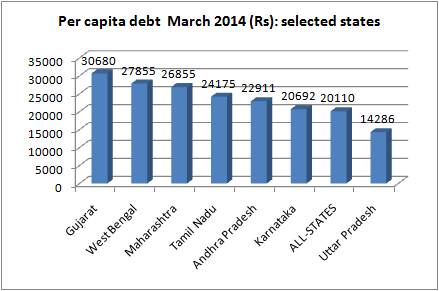At Rs 30,680, Gujarat's per capita debts are higher than of Andhra, Maharashtra, UP, West Bengal, others
Latest calculations have suggested that those who have been citing total debt figures to suggest Gujarat is not the highest indebted state are actually hiding an important fact. While Gujarat’s total debts – or “liabilities” in the Reserve Bank of India’s (RBI) lexicon – were Rs 1.85 lakh crore as of March 2014, and the states with a higher debts than Gujarat were Andhra Pradesh (Rs 1.94 lakh crore), Maharashtra (Rs 2.94 lakh crore), Uttar Pradesh (Rs 2.85 lakh crore), and West Bengal (Rs 2.45 lakh crore), this hides the crucial factor: Gujarat’s per capita debt is higher than all these “more indebted” states.
Thus, every child in Gujarat is born with a liability burden or debt of Rs 30,680, which higher than that of Andhra Pradesh (Rs 22,911), Maharashtra (Rs 26,185), Uttar Pradesh (Rs 14,284), and West Bengal (Rs 27,855). The all-India average of per capita debt is nearly Rs 9,000 lower than that of Gujarat, Rs 20,110. In terms of per capita debt, the states which have a higher debt liability than Gujarat are Punjab (Rs 37,004) and Kerala (Rs 35,847).
A year earlier, Gujarat’s per capita debts, if calculated on the basis of the data released by the RBI, were Rs 29,220, higher than all the major states which have a higher debt than Gujarat’s. West Bengal’s per capita debts were Rs 25,238, Maharashtra’s Rs 25,146, Andhra Pradesh’s Rs 20,495, and Uttar Pradesh’s Rs 13,628.
As is clear from these calculations, Gujarat indeed has higher per-capita debt than other comparable states, despite having the fourth highest outstanding debt in the country. The figures are based on the RBI report “State Finances: A Study of Budgets” for 2012-12 and 2013-14.
The report, which includes internal debt taken from the market and other funding sources as also different types of liabilities, has said that the state’s total debts would rise by about Rs 21,000 crore in a year, from Rs 1.64 lakh crore last year as of March 2013. A rise of 12.87 per cent in a year, this was the highest increase in the debts in the last three years.
Gujarat’s total debts were Rs 1.43 lakh in March 2011, rose by 5.79 per cent to reach Rs 1.51 lakh crore in March 2012, and further to Rs 1.64 lakh crore in March 2013, a rise of 8.50 per cent. Debts have been a major reason for the Gujarat government to avoid budget deficit in the recent past. They go to fund nearly 20 per cent of the state’s budget.
Significantly, if the RBI report is any indication, the state’s debts formed 24.6 per cent of the Gross State Domestic Product (GSDP) between 2010 and 2014, which is higher than the national average – 22.2 per cent. Debt-GSDP ratio signifies how deep a particular economy is in debt. Of the total Rs 1.85 lakh crore, Rs 1.45 lakh crore is internal debt.
The issue of debt sustainability of Gujarat has been a reason for major debate, especially among public figures. While politicians opposed to the BJP government in Gujarat argue that high debts are a reason of major concern, leading to great financial stress on the coffers, state officials say Gujarat’s debts are “perfectly sustainable”, as the state has paid all of them on dot.
State officials believe that a high rate of growth of the state economy is one reason why the Gujarat government is able to withstand any debt trap, in which states like West Bengal have got into. Critics, however, say that the state has been able to sustain high debts mainly because it has not been spending “enough” on the social sector, particularly education.



Comments